Women of South Sudan Stand Together
"I see changes. Previously, men thought, 'this woman has no voice to talk with us, even if it is my mother.' But now, men will give women the chance to talk first. They now recognize that we have voices and they want to hear what we have to say—we are talking about peace."
On March 10, 2020, over 85 women peacebuilders and leaders from all over South Sudan came, many for the first time in their lives, to the capital city of Juba to participate in the Third Annual National Women’s Conference. The conference happened against the backdrop of women in South Sudan working towards peace, stability, and increasing the role of women in politics. As South Sudanese women continue to advocate for political representation and peace, elevation of their voices is essential. Nonviolent Peaceforce is honored to have provided such an opportunity and will continue to support their work towards shared goals of peace.
{modal youtube="bW5I_L15d6Q"}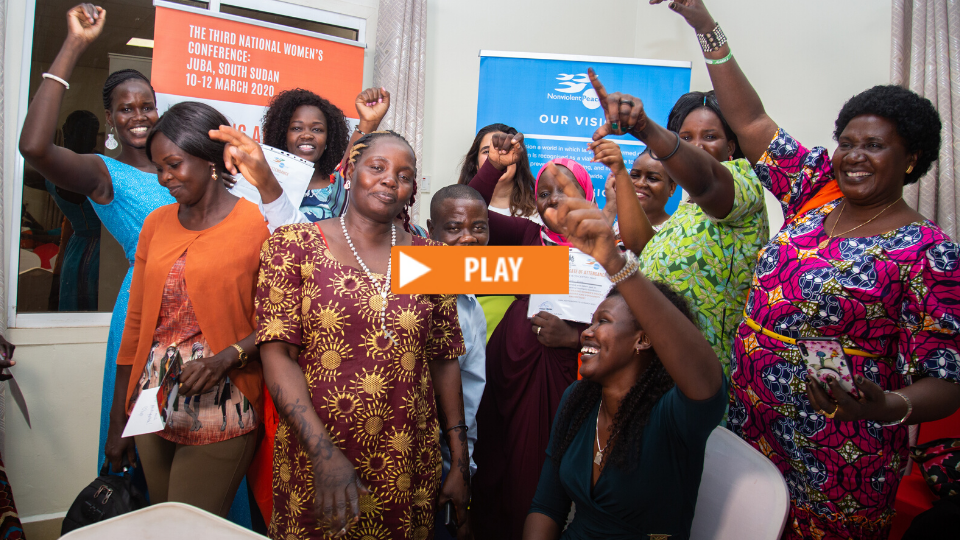
{/modal}
Deescalating Volatile Situations
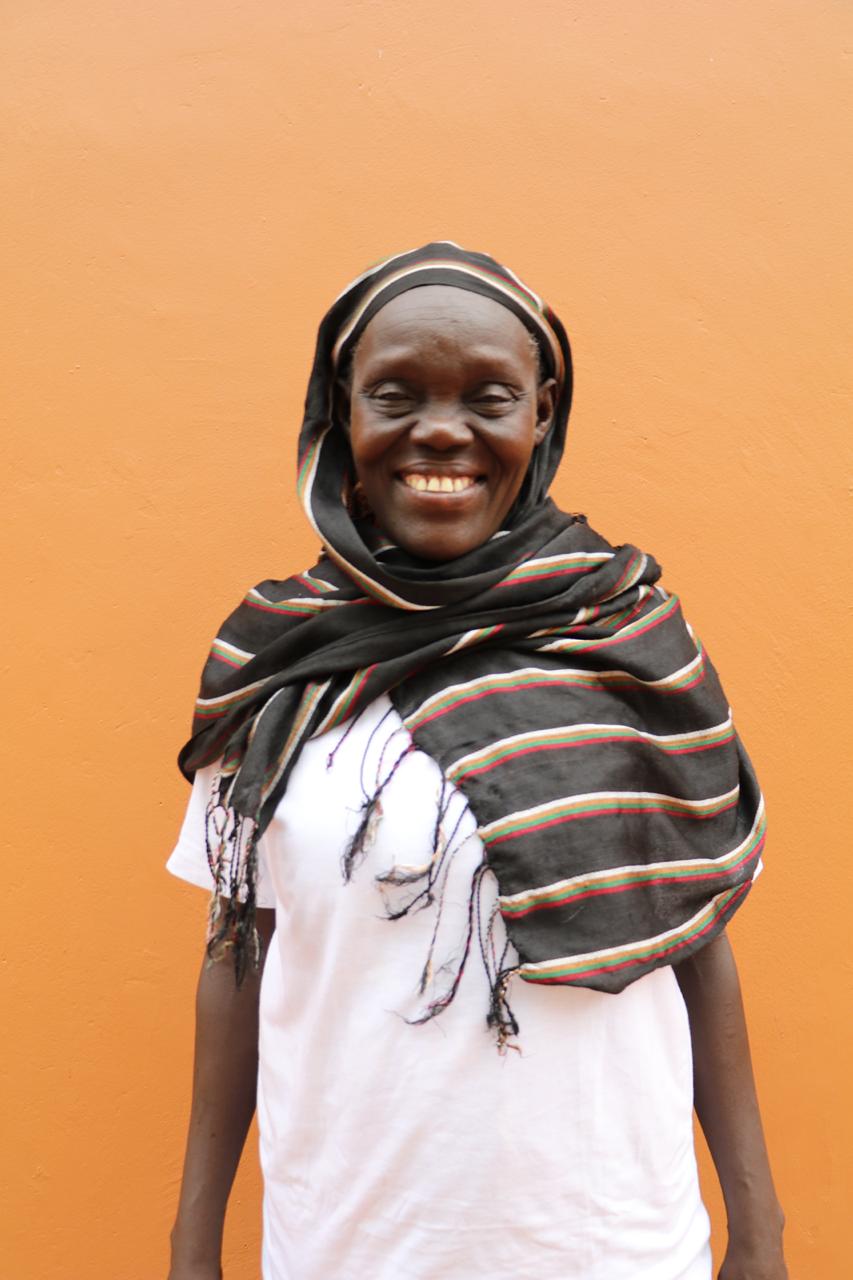
Charity joined the Mundri Women's Protection Team in 2017 and is an active peacemaker in her community. She has helped people resolve their disputes nonviolently, prevented instances of sexual and gender-based violence, and taught community members how to protect themselves in the case of a sudden attack. Charity is proud of her work, “I have skills now that nobody can take away from me. If anything happens in the community, they call me first to solve the problem because people trust me.”
One night, Charity heard a noise close to her neighbor's house and ran to see what was happening. When she approached, she found her neighbor in distress as two armed men were forcing their way inside the house. "I cried out ‘Oh, my dear sons!’ and I spoke to them as neighbors." The armed men said to Charity, “Leave! We will kill all of you now.” But Charity persisted. "Before, when I was not trained, I was afraid. But now that I’m trained on how to handle these situations, I’m not afraid."
Charity said, "I know you are suffering. You have no money. Your relatives are not here. That is why you are attacking people during the night or during the day. We know very well. Even if we have something we can contribute to you because you are suffering. If you are not here, we can not help you.” Charity invited them to come eat with her. "We shared food—we made a connection and they did not kill anyone.” Charity was able to convince them to leave without harming anyone. Sometimes people aren’t even aware of the trauma they are experiencing or causing.
This confidence to respond to violence is carried over into confidence in leadership. Charity hopes to help women in other communities form their own protection teams to improve the safety of civilians and increase women's leadership. As Charity noted, “In the past, women didn’t play any role in the community and didn’t have a voice in their own home. Now they play an important role, even in the government.”
Throughout the peace process, women have pushed for quotas to ensure their representation in decision-making bodies. In 2018, negotiators, 25% of whom were women, agreed that 35% of the next Transitional Government of National Unity would be women. As of March 2020, the quota has not been met, however, the efforts of women in peace talks have been commended and recognized as important for the stability of the country.
Sexual and Gender-Based Violence as a Tool of War,
Confronting it is a Tool of Peace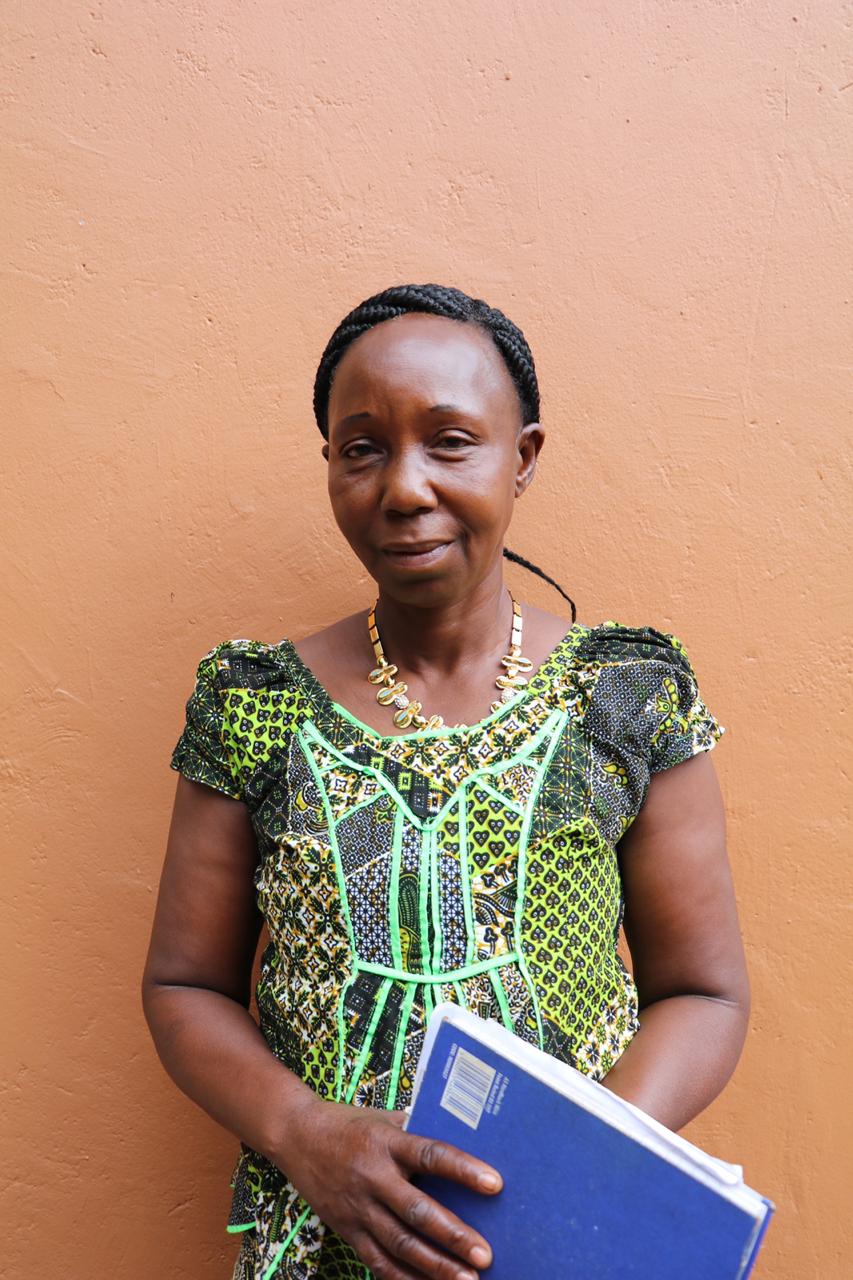
“Every day you could hear about rape cases—old women, young girls”, says Yodita, one of the forty female members of the Women Protection Team in Yambio. “I joined the Women’s Protection Team because I want to help people to understand what peace is,” says Yodita.
As Yasmin Sooka, Chair of the UN Commission on Human Rights in South Sudan has previously stated: "These are not random incidents of sexual violence but a systematic widespread pattern and characteristic of the conflict in South Sudan, where rape and sexual violence are used as a tactic of warfare against women and girls by all of the warring parties to sow terror and fear amongst the civilian population." Some 65 percent of South Sudanese women have experienced sexual or physical violence, twice the global average (some reports even higher).
The Women’s Protection Team that Yodita is a part of has played a crucial role in preventing sexual violence and supporting survivors in Yambio. Yodita’s protection team has raised awareness in her community on sexual and gender-based violence, resulting in a reduction of cases and an increase in reporting. Survivors are now aware of and feel more comfortable accessing post-incident services and seeking justice without stigmatization from their communities.
"Just a few weeks ago, we encountered a girl who is only about 7 years old who was sexually assaulted. We took her to the hospital where she gets treatment and counseling," Yodita recounted. "She is traumatized, but she is making progress. Before, if you talked to her, she would just keep quiet and look at you. Now, she is talking again. We are so proud of how strong she has been. This is a living example: because of the help of Nonviolent Peaceforce, we can say we are the peace implementers."
Even with progress towards reducing sexual and gender-based violence, Yodita noted that more work needs to be done, particularly in hard-to-reach places. Transportation constraints restrict her Women’s Protection Team access to such areas where sexual and gender-based violence needs to be addressed. Nonviolent Peaceforce has covered transportation expenses for travel to places where people are particularly vulnerable and worked with humanitarian partners to provide bikes for the women.
Advocating for the Next Generation of Girls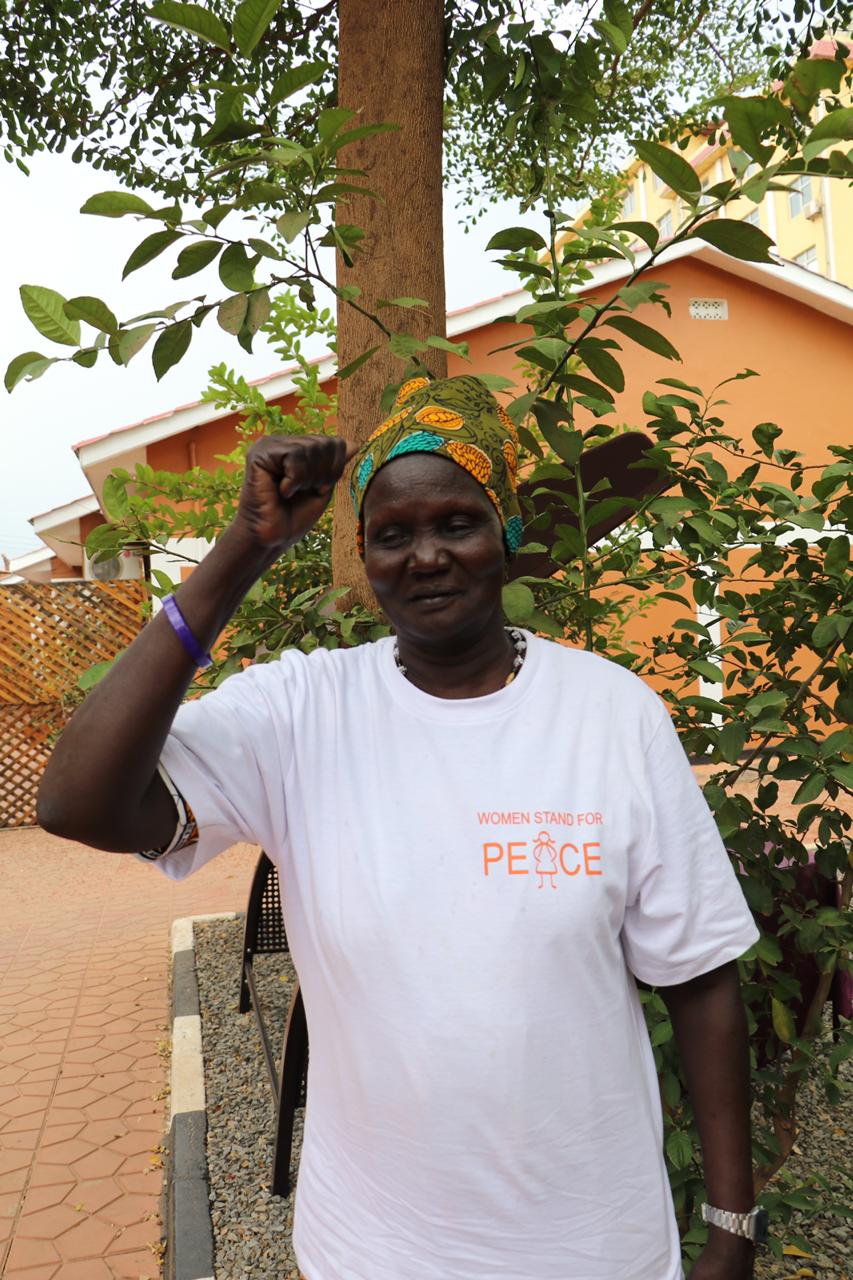
Sarah, a mother of five, joined the Ulang Women’s Protection Team to identify and advocate for the needs of her community. Prior to Nonviolent Peaceforce training on nonviolence and unarmed civilian protection, Sarah from Ulang admitted she would resort to violence during situations of conflict. She recalled, “I didn’t like to forgive people. Now, even if someone provokes me, I respond nonviolently and look for a way to find common ground.”
A large part of her work on nonviolence is supporting the next generation of girls. "We advocate for children’s rights. ... A key part of this is advocating that all children are equal so that no children are banned from attending school, especially the girls," shared Sarah. "Because, if the girls are left behind, they are at risk to be married earlier. This is also one of the challenges that we have not yet met—ensuring the future of the young generation."
Some 52% of girls in South Sudan are married before their 18th birthday and 9% are married before the age of 15. The reasons are complex, but among other factors, many girls and women have been forced into marriage and prostitution during South Sudan’s conflict in order to survive.
Sarah has become a resource for the community, with people approaching her for help into the night. No matter how late, her children always encourage her to help whoever is need. Sarah's work on her Women’s Protection Team is a source of pride for her and her family.
Looking forward for her children and beyond, Sarah reflected on what she hopes for the women and girls in her community. "A long time ago, women and girls were not allowed to go to school. Now they are allowed to go, but not many do. In the future, I think girls and boys will be equal to study and work together.”
{modal youtube="eJK4o46DdKU"}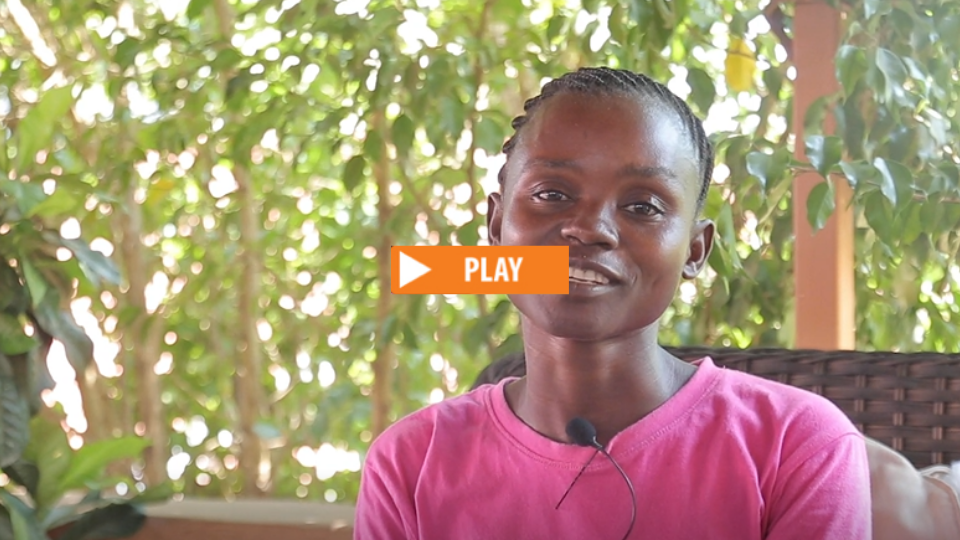
Stopping the Cycle of Violence at the Beginning

Grace from Yei always wanted to help people live in peace. Before joining the first Women’s Protection Team in Yei, she worked with her church to support peaceful living. Through Nonviolent Peaceforce trainings on peacebuilding, child protection, and sexual and gender-based violence prevention and response, Grace said “We learned how peace could be made. Now, if there are any issues in our community or a community nearby, we know how to respond.”
“Everyone, the community members and the soldiers, respects us when we are in the Women’s Protection Team uniforms, because they know that we were trained to bring peace.”
"Through our trainings with Nonviolent Peaceforce, we learn how the cycle of violence starts, and how it must be stopped before it builds." Grace sees how important this will be when welcoming back members of the community who fled the war in 2016.
"Most people fled and were refugees in Uganda or the Congo." The number of refugees who fled to nearby Uganda was over 1 million a few years ago, with over 861,500 refugees still there in 2020. "When they come back, they come dealing with trauma, stress, and perhaps anger over what they have lost. But we will be able to train them on nonviolence. They will have the chance because the soil will forever remain here. God will give them the energy to plant."
Now, with an influx of refugees returning from Uganda and the Democratic Republic of the Congo, maintaining peace remains extremely important. Grace said their Women’s Protection Team will focus on engaging with both host communities and returnees to ensure a peaceful coexistence.
Being the Change
"I want to change the situation that women are in. I want to be a voice of women and peace.” Wearing their bright pink t-shirts, Maypal from Lankien and her fellow Women’s Protection Team members aim to prevent violence and protect vulnerable members of their 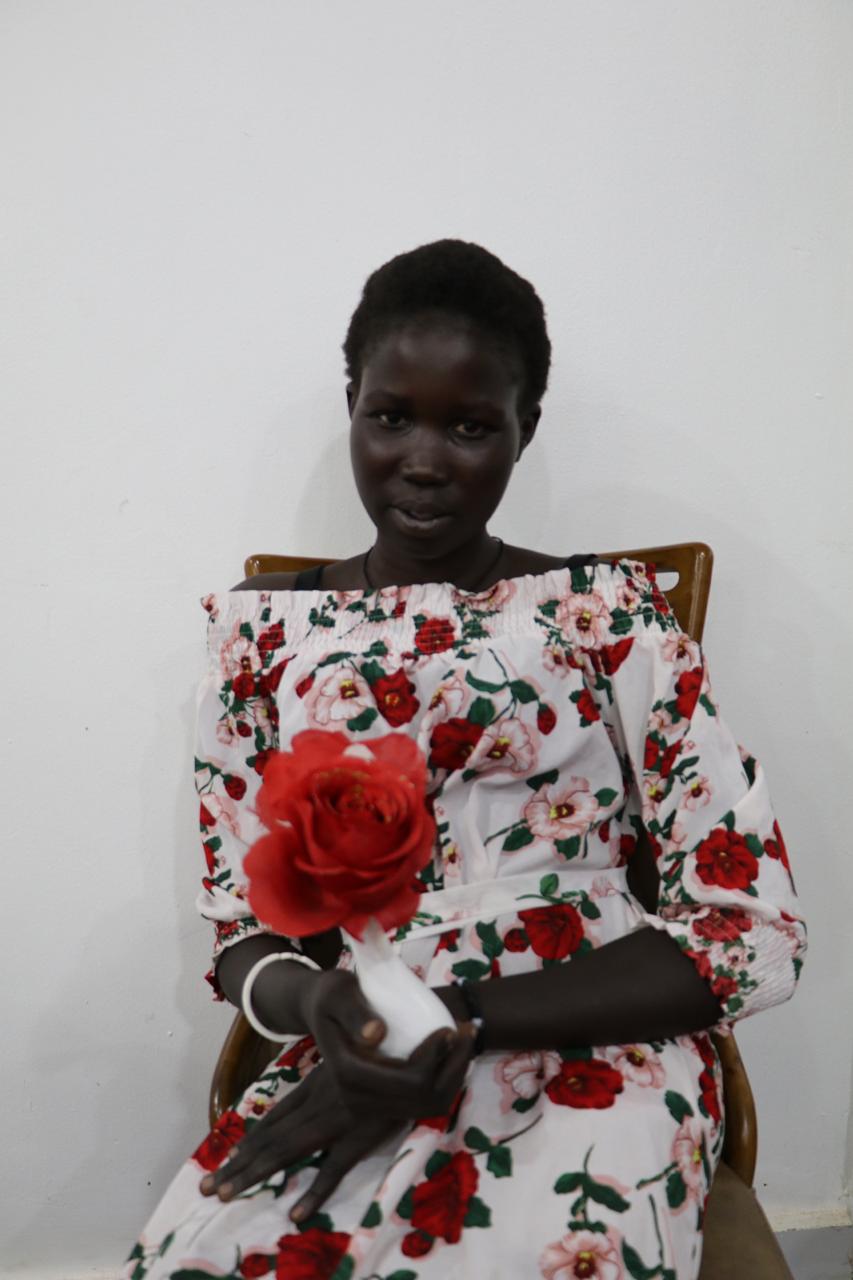
Maypal's experiences during patrols, while often difficult, serve as reminders for the importance of Women’s Protection Team work. "On one patrol during the rainy season, my team and I found a child, under the age of 15, sitting under a tree. We learned that the child had been assaulted by a charcoal maker while on her way to a relative’s house. With the survivor’s permission, we accompanied her to a hospital, informed the family, and reported the case to Nonviolent Peaceforce for further follow-up." On another patrol, Maypal and her team found two children, both under the age of 3, whose mothers had passed away. The women of the Women’s Protection Team took the children under their care.
Maypal's protection of the vulnerable members of her community has included patrols as well as advocacy work. During heavy flooding in Lankien, the Women’s Protection Team identified vulnerable individuals and successfully advocated to the governor for their relocation. Maypal has been a vocal support for her community and tangibly changed the lives of several vulnerable members. Following her successful advocacy to the governor Maypal proudly noted, “My voice was heard."
* * *
These stories were shared at the Third National Women's Conference in Juba. The conference created a space for members to share diverse experiences under the shared goal of peace and stability for women and their communities. The conference highlighted women's roles as powerful peacekeepers, leaders, and advocates and supported further discussion, collaboration, and coordination in their path towards peace and justice. Nonviolent Peaceforce was able to host the 3rd Annual National Women's Conference together with support of the UK Foreign and Commonwealth Office’s Conflict Security and Stability Fund (CSSF).
